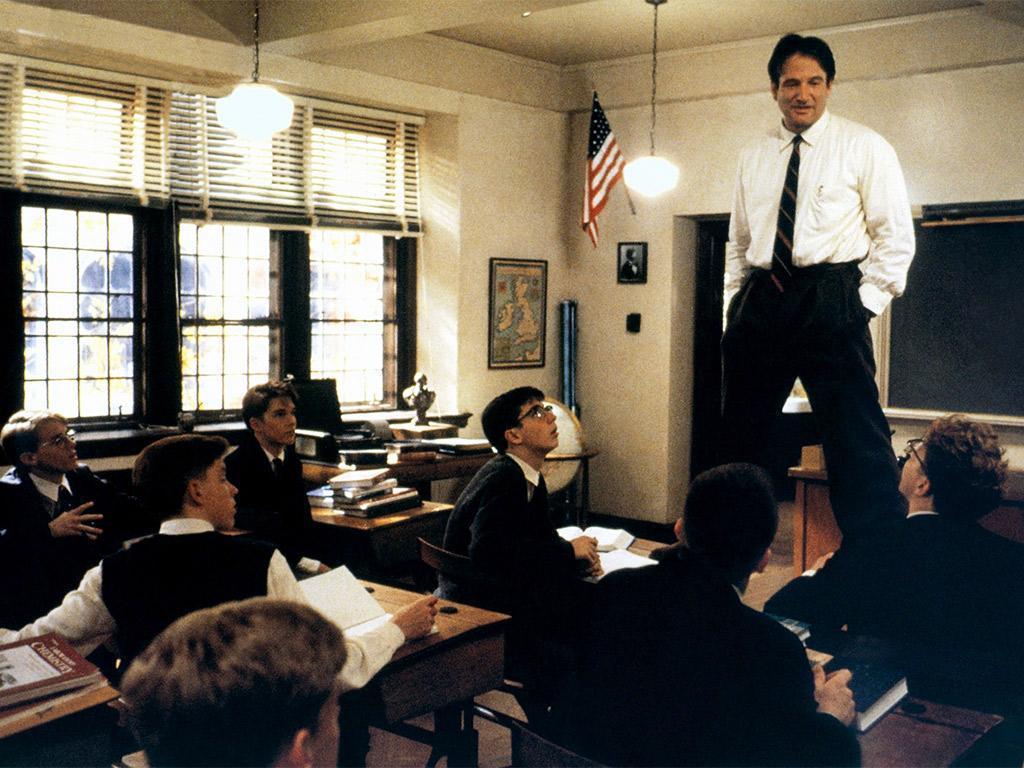In Dead Poets Society, a well-known 1989 film by Peter Weir, an inspired teacher who opposes the conservative community is portrayed. John Keating teaches English and literature; during his lessons, the instructor not only explains the material to students but also talks to them about life. The man is an example of a true teacher who is loved by students.
The action takes place in 1959 at a prestigious and conservative boarding school named Wellton Academy. The institution is located in a fictional town in Vermont; it prepares young men for entering the best universities in the USA. The plot centers around 7 high-school students who dislike Wellton Academy despite its status and call it Helton. On the first day of the last school year, the main characters meet a new English teacher, John Keating. His name sounds like the one of John Keats who was a well-known English poet and whose romantic views might have affected the world outlook of the teacher. In the first lesson, it becomes evident that Keating is different from other Wellton instructors. He is energetic and inspiring; the man leads children to the school museum and shows them the photos of adolescents who have studied at Wellton before. The teacher wants his students to understand that life is shorter than it seems to one when they are a teenager. Keating also emphasizes the importance of the Cape Diem principle and advises students to do what they love.
Later, John Keating tells his students about Dead Poets Society, a poetical club that used to function at Wellton. The 7 adolescents and the teacher resume the meetings of the society but keep this fact secret. Keating continues inspiring the young men; under his influence, one of the schoolchildren, Neil Perry, decides to oppose his father’s opinion and become an actor for he is talented and loves the profession. The teenager receives the role of Puck in A Midsummer Night’s Dream; his domineering father learns about that just before the first performance. The man tries to make Neil quit theatre because he has chosen a medical career for his son. Neil turns out to be unable to stand against his father and lacks support; that is why after the first performance, the young man commits suicide.
The Perry family initiates an investigation of Neil’s death; one of the deceased teenager’s peers discovers everything about John Keating’s philosophy and the poetical club. Wellton’s teachers and principal dislike Keating and blame him for what has happened; thus, the inspiring instructor gets fired. The relationships between Keating and their parents are also bad because they do not understand their mistakes. As for students, they still respect and like John Keating because the classroom instruction portrayed in the film is unusual, inspiring, and effective.
The portrayal of the teacher is unrealistically positive because it is hard to stay such an energetic and devoted person for those who work at school. The rest of the instructors and the principal are depicted as unrealistically negative for they all demonstrate extreme conservativeness and close-mindedness. This film might affect social expectations negatively; it confirms stereotypes of teachers’ portrayals by media described in “Media Distortion of the Teacher Image” (Swetnam, 1992). The movie shows a school community as strict and indifferent. Besides, viewers can get a feeling that it is hard to change anything in the education system.

References
Johnson, A. (2018). “The book list: The poems that give “Dead Poets Society” life.” Independent. Web.
Swetnam, L. A. (1992). Media distortion of the teacher image. The Clearing House, 66(1), 30-32.